What Life Looks Like in a Post-Roe World, One Year Later
Five women on the challenges they've faced—and where we go from here.
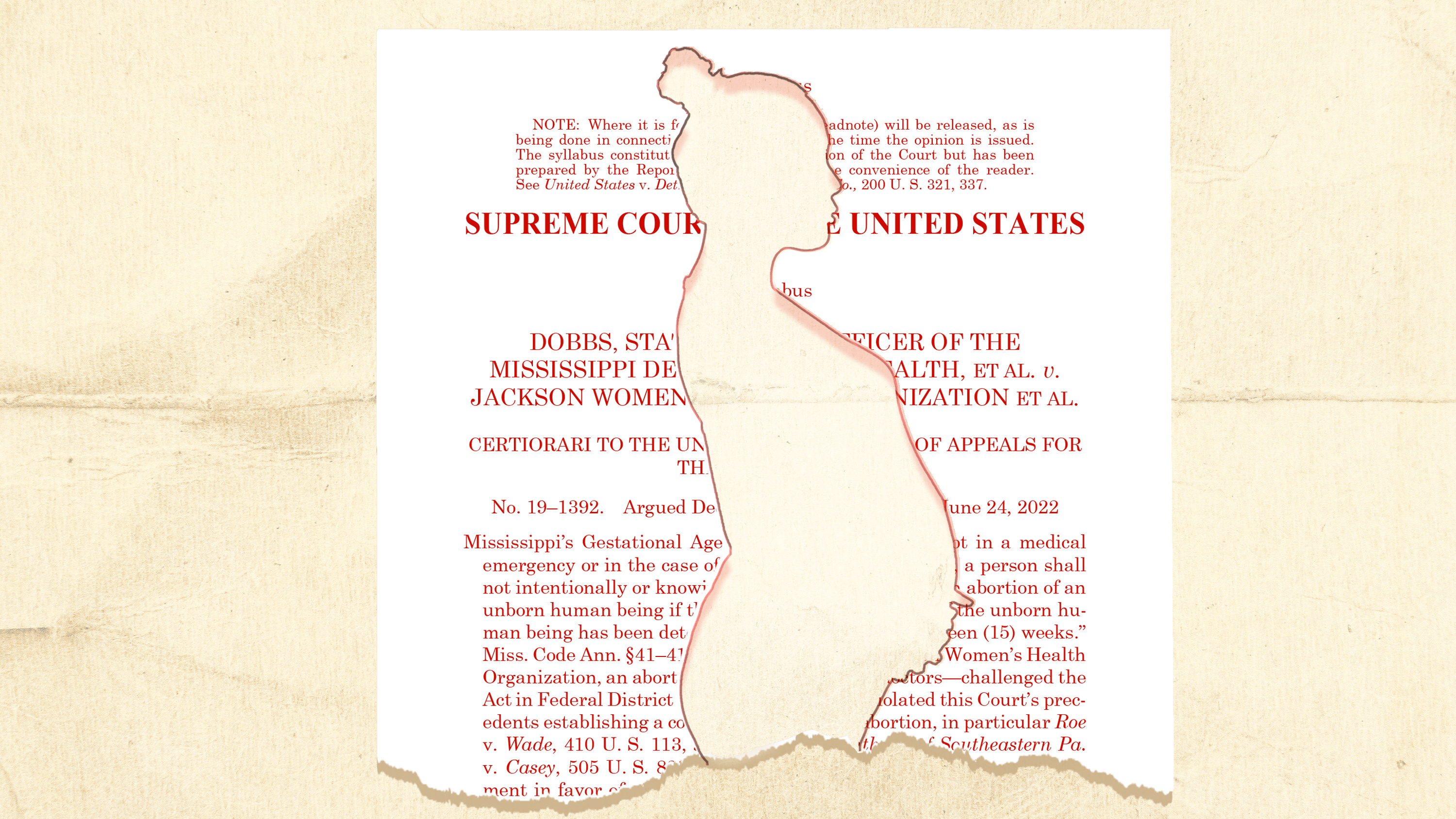

Last June, the Supreme Court ruled in Dobbs v. Jackson Women's Health Organization that the right to an abortion is not constitutionally protected, overturning Roe v. Wade, the law of the land for nearly 50 years. The decision left many—doctors, legal scholars, pregnant people—wondering, What happens now?
Well, so far: Abortion is banned or severely restricted in 16 states (as of June 20, 2023), and according to new research by the Guttmacher Institute, nearly 700 abortion bills have been introduced in 2023 so far. (Half of the legislation has been to restrict access, while the other half is aimed at expanding it.) #WeCount data showed that an increase in abortion numbers in states friendly to the procedure did not make up for the decline in abortion-hostile states, meaning there are people who have not been able to get the care they seek.
But the dismal reproductive health landscape has taken a human toll that cannot be captured by numbers. Many women have been denied care despite being diagnosed with an exact exception listed in abortion bans. Miscarriages are getting more dangerous, with pregnant women* being sent home from hospitals to wait to deliver nonviable fetuses. These problems compound for women of color, who already suffer the worst maternal mortality rates in the country.
To get a deeper understanding of life in a post-Roe world, Marie Claire spoke to five women who were deeply impacted this year. From near-death experiences to the emotional whiplash of trying to provide women with the healthcare they need, these are their stories.
Exceptions in Abortion Bans Don't Work
Nancy Davis, Louisiana
On August 2, 2022, I was ten weeks and five days pregnant when I received a devastating diagnosis no parent ever wants to hear about their wanted pregnancy. I have three children, so this wasn’t my first rodeo and during my anatomy scan, I noticed the fetus looked a little different. The ultrasound technician stepped out to get the doctor, who walked into the room and said, “Oh my God” when she saw the image. It looked like the top of the fetus’s skull was missing. As I bawled, she gave me a big hug and said, “This is one of the diagnoses where you can get an abortion.” It was a horrible, out-of-body experience.
Being an optimistic mother, I thought there was maybe some type of way we could beat this. But the following week I met with a maternal-fetal medicine specialist who confirmed my fetus had acrania, a rare and fatal condition where the skull does not form inside the womb. He told me and my fiancé that this is the worst case scenario and we should terminate. He said if the baby survived through birth, he or she would die within minutes.
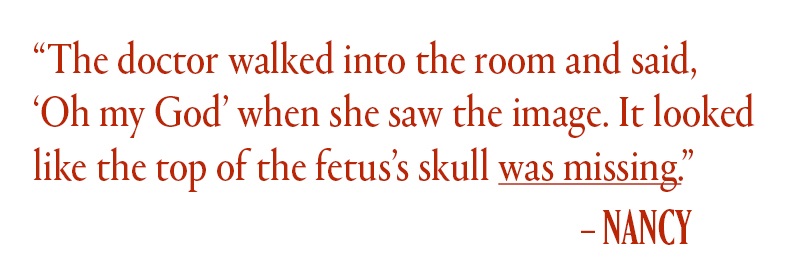
He told me he could do the procedure, but it would be expensive so he sent us to a nearby abortion clinic, not knowing it had closed for good. [Editor's note: At this time the state’s trigger ban was being challenged in court.] Then, when we went back to schedule the procedure with the specialist, they told us the director of the hospital decided she wouldn’t allow the procedure because the fetus still had a heartbeat. The process was confusing and heartbreaking. Yeah, abortions were outlawed in Louisiana but there were exceptions in place for nonviable fetuses, so what does the heartbeat have to do with anything?
Get exclusive access to fashion and beauty trends, hot-off-the-press celebrity news, and more.
They told us the nearest places to get an abortion were Florida or North Carolina. We didn’t have the means to pay for travel, to get the procedure, to cover the cost of childcare. With the help of Planned Parenthood of Greater New York, The Brigid Alliance, and a GoFundMe, I was able to travel to New York to get care. It was all mentally, physically, and emotionally draining.
The Dobbs decision has truly impacted my life, forcing me to become an activist and advocate for reproductive justice. People around the world reached out to share their stories, and they still are reaching out. We started the Nancy Davis Foundation to assist individuals who have experienced trauma as a result of a developmental defect during pregnancy and we are inspired to evoke change.
[Editor's Note: After Nancy Davis went public with her challenges regarding abortion care, acrania was specifically added as an exception to the state’s abortion ban—one of the strictest in the nation. However, women who should technically qualify for exceptions are still finding it impossible to receive care in Louisiana.]
Safe Haven States May Not Always Stay Safe
Jenna Beckham, M.D., North Carolina
I’m a board-certified obstetrician-gynecologist and I provide a full spectrum of reproductive healthcare, which includes abortion care. A year ago, I was reading on an airplane when I glanced at the TV screen of the person sitting next to me. They were watching Fox News and the Dobbs decision was flashing on the screen. I started crying, paid for Wi-Fi so I could access all of the messages blowing up my phone, and rang the overhead button for the flight attendant to bring me a drink.
Being in the south, a lot of our surrounding states quickly enacted restrictions or complete bans. That summer, North Carolina instantly became a haven state for abortion care and we started seeing a really massive increase in our volume overall of people traveling from other states to seek care. I remember a patient who had worked a 12-hour nursing shift in Louisiana, left the hospital at 7 p.m. and drove overnight straight to North Carolina, had her medication abortion and was driving back that same day all by herself. I asked if she felt safe to drive and she responded, “I have to go back to work and get back to my children.”
Not only did the volume of people increase, but the coordination of care and complexity of it really changed. We used to have a rule that patients couldn’t have sedation unless they had a support person available to drive them home. After Dobbs, we had so many people coming alone—their driver was Uber—it became necessary to change the rule.
In my non-abortion work, I’ve seen a tremendous shift in people anxiously rushing to get IUDs or sterilization. One patient’s partner had a vasectomy and she had her own surgical sterilization because she doesn’t want to risk getting pregnant.
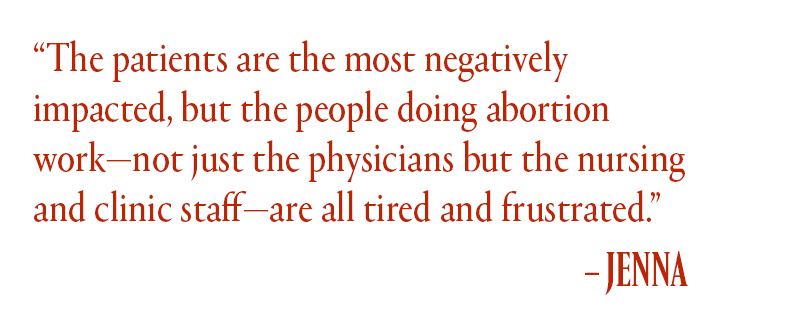
We felt so special and lucky to be in our state, which still had barriers but was pretty good compared to our neighbors. But then [in May] they implemented a 12-week ban in North Carolina.
I spoke at the state congressional hearings and it’s tough to sit silently listening to people—who are not healthcare providers—say things that are absolutely false, not based in science and completely wild exaggerations of what really happens in a procedure room.
The patients are the most negatively impacted, but the people doing abortion work—not just the physicians but the nursing and clinic staff—are all tired and frustrated. People have chosen this job because they obviously feel very passionate about providing this care and it’s hard to do it feeling all these restrictions and seeing the grief and stress and burdens on our patients. The staff and the providers really carry a lot of it.
I want to do what is medically right for our patients, but I have to remind myself that if I lose my medical license or go to jail over one patient, then that means there are thousands of others down the line that I won’t be able to care for. It takes a toll.
Life-Saving Medical Care Is Denied Out of Fear
Anya Cook, Florida
Last July, my husband and I started IVF after multiple miscarriages. It was successful and we were completely elated; this was a pregnancy I’d worked extremely hard for. For the first trimester, I didn’t do anything—not even go to the grocery store—because I was nervous about losing my baby. In December, at 16 weeks, I finally decided to look for baby cribs. I wore rhinestone sandals and pink bike shorts to show off my bump and went to different baby outlets with my husband. I saw all the pregnant women and was like, I belong here. I held my belly and laughed and felt like I could finally talk about a child that would be here.
That following Wednesday when leaving a restaurant, I felt like somebody had thrown water on me. I felt down in my underwear and said, "It feels like my water broke, but that’s impossible—I’m only 16 weeks." We went to the emergency room and waited for almost an hour. When I finally got an ultrasound we could clearly see my daughter was moving and had a heartbeat, so I had hope.
Then the doctor told me I had preterm premature rupture of my membranes and that I would end up delivering my daughter, but that because I was nowhere near viability she would not survive. [Editor's note: PPROM is a rare condition that can cause severe complications threatening the life of the mother.]
He said he couldn’t induce labor because he might get in trouble—due to the then-15-week ban in Florida—since, technically, my health was not at risk and my daughter still had a heartbeat. I had to go home and wait. I came to the hospital for help, not for them to tell me I’m on my own. But that’s exactly what happened.
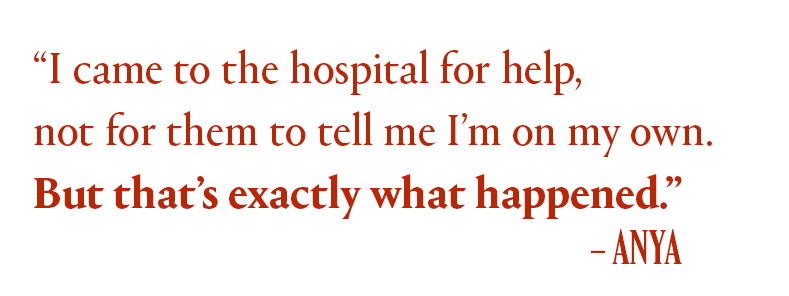
The next morning I went to the hair salon. I have very long locs. Years ago, my best friend was killed, and at her wake her mom commented that she was grateful Kim always kept her hair styled, so she hadn’t needed to have her locs done after she died. That always stuck with me. So that morning I told my mom, "If I deliver her, I don’t think I’m going to make it through that. Please take care of Derick [my husband] and, don’t worry, you won’t have to get my hair done." She knew what I meant and got very upset. I didn’t see her again until the next day when I woke up in the hospital.
At the hair salon, I went into the bathroom and heard my grandmother’s voice in my head telling me to push. I delivered the baby in the toilet and asked Derick to come into the bathroom to help me deliver the placenta. I started hemorrhaging, the paramedics came and rushed me to the hospital. I almost died; I lost half the blood in my body. In the months since then, I had to have multiple surgeries to finish removing the placenta and, now, if I get pregnant again, it will be extremely high-risk.
If they had just operated on me at the hospital when I first went, I would not be in this situation. Just before Florida passed a six-week ban, Senator Lauren Book spoke about my case. They still voted for that ban after hearing my story. But I don’t care about their six-week ban. I just got a new IVF transfer and I’m going to continue to fight to have a baby, because that is my right.
Medication Abortion Became a Target Nationwide
Farah Diaz-Tello, New York
A lesson that I’ve learned this past year, as a reproductive justice attorney and senior counsel at If/When/How, is that there is a lot of ground still to fight on when it comes to the criminalization of people who end their pregnancies. And I want us to hold that ground. When abortion groups try to pass these truly wild, overreaching laws criminalizing people for having miscarriages, for example, those generally haven’t gained traction. I want to urge people to resist the political nihilism of saying all abortion opponents want to throw everybody in jail, because that normalizes it.
It’s important for us to continue to say, "That’s a radical fringe," and just because prosecutors are always doing the most doesn’t mean that they are allowed to. I want us to be able to recognize the protections that still exist and fight like hell for them and not rhetorically give them up, because that is dangerous. It feeds the prosecutorial imagination. Judicial interpretation of laws becomes the law. They have enough bad ideas as it is, we don’t need to add any more to the pot.
We always knew that if Roe fell, one of the primary targets was going to be medication abortion. Through the pandemic, we had a highly successful living experiment for how safe, effective, and convenient it could be for people to get abortion care using pills received by the mail. I can see how that would be terrifying for those who want to control people’s abilities to make those decisions.
What I naively did not anticipate post-Dobbs was that a case like the Alliance for Hippocratic Medicine v. FDA, in which a Texas judge ruled to halt the FDA’s approval of mifepristone, could make its way through the courts. That’s a case that does not pass the smell test for the most part, but [anti-choice activists] did such an effective job of finding a judge who is so ends-oriented, he’d essentially disregard the law and science. That’s staggering: The idea that you could undo more than 20 years of medicine and law like that? Medications that have been designated life-saving medications by the World Health Organization?
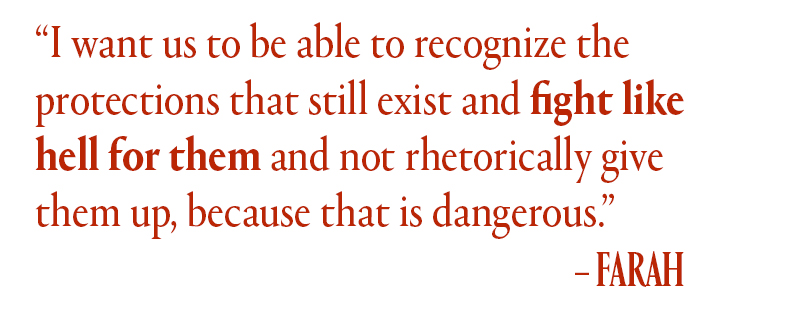
Additionally, I do think that lawmakers have a certain group of people in mind who they think they’re controlling when they’re passing these anti-abortion laws, and they’re not realizing the grave harm that can come to people. There has been more than one occasion where I have been extremely worried that somebody was going to die on our watch. Like, if somebody's calling from an abortion-hostile state and they need care and can’t leave the state. The fear that somebody you’re trying to help is going to die and there's nothing you can do about it, I can’t tell you how heavy it is.
I wish that the people who thought these laws were a good idea had to speak to the crying loved ones of people afraid they’re going to lose somebody that can’t get the healthcare they need. To tell somebody they must risk their life or go through the life-changing experience of a pregnancy whether they like it or not. They haven’t had to confront what that really means and I wish they did.
Abortion Is Just the Beginning—All Reproductive Healthcare Is On the Line
Diane Derzis, Alabama
Having been in this business for so many years, and as the owner of the clinic at the center of Dobbs, we knew the fall of Roe was coming. When Trump was elected, that was the end. The leak of the Dobbs decision draft just confirmed it. When the decision came down, I had been waiting for it every day. What this meant was it was time for women to rise up in this country and demand their rights.
Seeing the women and what they’ve had to go through this past year... thinking about what would happen after Roe fell and watching it actually happen are two completely different things. Physicians leaving states with abortion bans and stopping the practice of obstetrics and gynecology because they’re scared to death—that’s frightening. People don’t understand that, I guess. And the worst things happen when you are afraid.
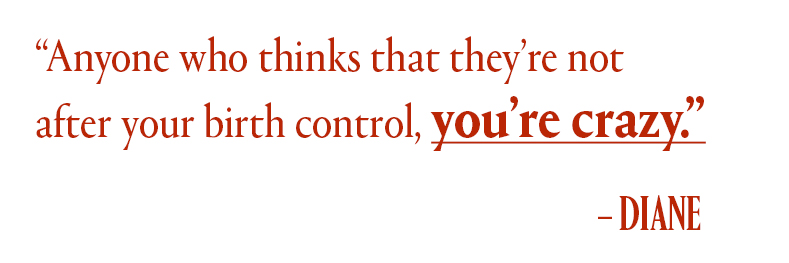
And people should be afraid of the direction things are going in. Anyone who thinks that they’re not after your birth control, you’re crazy. That’s next. How do we get women and men to understand that it’s time that we take to the streets and demand our rights? How much are we willing to take before it’s too much?
I’m mostly angry, but I’m taking out my anger by building more clinics. We moved Jackson Women’s Health Organization from Mississippi to Las Cruces, New Mexico. We started a clinic in Bristol, Virginia, and are opening one in Chicago, Illinois, soon.
Two years ago, I had the opportunity to buy a clinic in North Carolina and I thought, no that’ll be gone soon. Then this past year I thought, I was clearly wrong [when N.C. became a haven]. And now look where we are [N.C. has a new 12-week ban]. But Shannon, our executive director, says she thinks every day could be the last day anywhere, and that’s so true. Once again, we’re relying upon other people to take care of us—the government, the Democratic party. As women, most of us were brought up to depend on men to take care of us. I think it’s time that we realize there’s no one that’s going to take care of us but ourselves.
Go to the polls and vote.
*Editors’ note: We use the terms “woman” and "women" in this article to refer to people with internal reproductive organs; however we understand that not everyone with internal reproductive organs identifies as a woman.
Lorena O'Neil is a reporter and photojournalist based in New Orleans covering reproductive health, gender, culture, and politics. She has written for The Atlantic, Elle, Esquire, Jezebel, and NPR.
